George Cunningham: Second World War in Broomhall ~ Part 18
The End of the War: Old Friends
Researched by Gemma Clarke
The Victory in Europe Street Party brings back some old characters of Broomhall! The pictures show the characters and what stories they were involved with along George’s life story.
An Old Friend
‘All of a sudden I saw, standing alone on the fringe of the crowd, Edgar Colcutt, the friend and mentor of my childhood. He was dressed for the occasion in a green-with-age frock coat, baggy flannels and a straw boater with a tram ticket stuck in the band, and stood staring vacantly but good-humourdly at the happy gathering. I felt a pang of guilt at not making any attempt to visit him during the war, so I went over and enquired how he had been keeping.’
‘A bower quiet for me and a sleep full of sweet dreams, health and quiet breathing,’ he replied, adding dryly, ‘Keats, Endymion, in case you have forgotten.’ All I could do was apologise for my absence and make a promise to renew our friendship now that hostilities had ceased. He thanked me courteously, then remarked, a trifle sarcastically, I thought, ‘Peace hath her victories, no less renowned than those of war.’ A little chastened, I helped carry back home some of the tables and chairs, now that the party was breaking up.’
Lights again!
‘I walked in the twilight down the Owd Lane with Norman, turned the corner at Polly Brady’s shop and through force of habit made for the corner shop. Just as we reached the step, a blaze of neon lights illuminated all the front of the Co-op, the first time for six years. ‘That’s a good sign,’ exclaimed Norman, ever the optimist, ‘Ar bet il’ll bi a fine day tomorra!’
‘Another harbinger of good times ahead was the sound of a raucous rendering of ‘Lily Marlene’, delivered flatly but with gusto and apparently performed by a duo. Both voices were strangely familiar, even though distorted by drink, and, coincidentally with the words of the song, two figures passed under the light of a lantern, not by the barrack gate, but a gas lamp in Clarence Street.’
Familiar Faces
‘I recognised, as they clung together with arms around each other’s shoulders, reaching for even higher notes, Albert Moxay and Harry Flathers. They both let out a home coming whoop of greeting as they drew near. Albert was in khaki, and browned by a sun hotter than we ever knew in this country, but Flathers was blanched white as a stick of celery, no doubt due to his underground activities. Both were in excellent spirits, and smelling of them too, as they shook hands with Norman and me.’
‘I on’y landed dis mornin’,’ cried Moxay, ‘Ar’ve bin orl o’er shant, North Africa, Sicily, Italy. Wot yor been up to? Flathers, not to be outdone but still with his old habit of looking backwards to see if he could be overheard, confided hoarsely, ‘Di sent me up ter pit in Durham. Fooaks wor reight enuff, danose, burra cudden’t mek art wot di wor clackin’ abart. Tha’d a’ thowt thi’d tork same as me an’ dee wunt da?’
‘Moxay took out a pack of Camels, gave one to Flathers, then suddenly he shouted, ‘Arberra can still gerra leet fer nowt!’ and promptly shinned like a monkey up the gas lamp, straddled the crossbar, pushed the fag up to the mantle, lit it, then slid down to land lightly on his feet. He took a deep drag, exhaled and again enquired how I had gone on during the war.’
Feeling Down!
‘My Home Guard and fire watching exploits would have sounded trivial compared to the adventures that he, and even Flathers, must have had. Norman, too, had little to brag about, having spent the war years bent over a lathe in an engineering works on Harrow Street, so speaking for both of us, I replied, ‘There hasn’t been much doing at all round here’ and left it at that.’
‘The pair of them were determined to make a night of it, agreeing that their next port of call would be Harry Gilchrist’s pub at the corner of Milton Street. In spite of their plea to ‘Cum on, let’s mek a neet on it’, we declined the invitation and the duo stumbled up Clarence Street, singing a novel arrangement of ‘We’ll Meet Again’, pausing every now and again to argue about the proper words.’
PP. 132-138, Chapter 28, More George! (courtesy of The Hallamshire Press Limited).
Vincent Crookes (Vinny) 1924-1943
This showed when George found out about his old friend being lost and how he felt about his own life as, ‘all this faded into insignificance one night, when, turning the pages of the Telegraph, a tiny paragraph overshadowed everything. In a few lines it stated, ‘Sergeant, Air Gunner, Vincent Crookes, missing in a raid on Hanover, October 18th/19th.’ The same age as me, nineteen, a hero of many bombing raids, had given his all for his country and what had I done? I stared at the print in disbelief, thinking of the last time I saw Vinny, as he waved goodbye.’
PP. 114, Chapter 24, More George! (courtesy of The Hallamshire Press Limited).
Quietness at last
‘As the din died away, quietness settled down once more on the street corner. Lights appeared in house windows; Mrs Freeman let her cat out; Edgar appeared at his door to have a last gaze at the solar system before locking up, leaving Norman and me, two of us where once there had been three, standing as we had done so many times on the old corner shop doorstep. A plane droned high overhead, a presence no longer a cause for fear. We both stared upwards until its friendly lights winked away into the heavenly vault, and the silence that followed seemed even more profound.’
Reflections
‘I wish owd Vinny could have made it,’ murmured Norman, echoing my thoughts. He took his leave and I was left alone on the old stone step, reflecting that at the age of twenty, after six years of tumultuous events and tremendous battles, I had come out of it as a half-trained die-sinker, a fire watcher who had never doused a conflagration, a part-time soldier who hadn’t fired a shot, a bookie’s runner who couldn’t back a winner, and a thwarted lover.’
P. 138, Chapter 28, More George! (courtesy of The Hallamshire Press Limited).

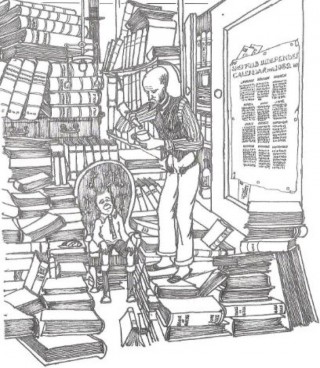
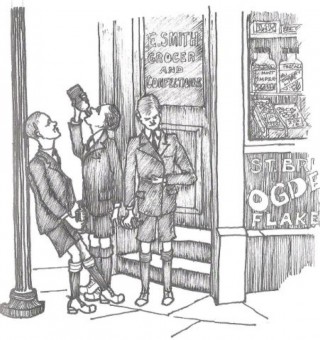
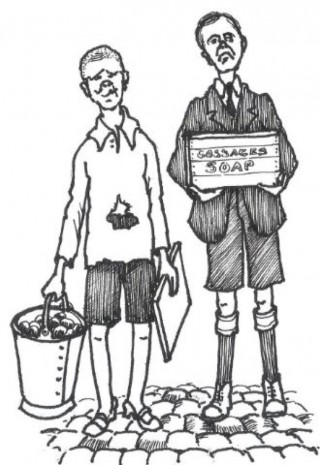
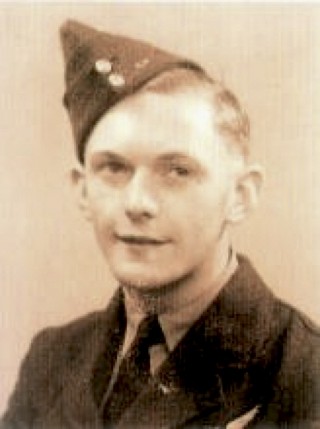




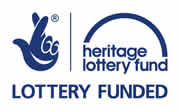



No Comments
Add a comment about this page